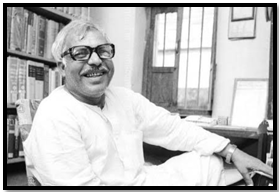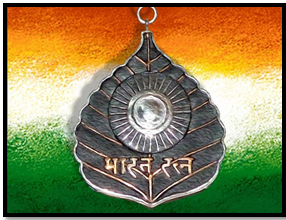KÁRPOORI THAKUR: A JAN NAYAK WHO RELENTLESSLY FOUGHT FOR SOCIAL JUSTICE
Relevance:
GS 1
- Social empowerment, communalism, regionalism & secularism.
Why in News:
- Former Chief Minister of Bihar Karpoori Thakur was conferred the nation’s highest honour, Bharat Ratna, posthumously by the President.
Source- India.com
Karpoori Thakur, often referred to as the ‘Jan Nayak’ or People’s Leader, was an iconic figure in Indian politics, known for his tireless advocacy for the poor and marginalized sections of society. His political journey was marked by immense struggle and resilience, reflecting his deep-rooted dedication to the principles of social equality and empowerment.
Early Life and Political Inception:
- Kárpoori Thakur rose from the Nai community, overcoming significant barriers to emerge as a notable political figure.
- His political journey, influenced by his early recognition of Congress’s deviation from its foundational principles, began in the 1950s, marked by his involvement in the Quit India movement.
Here is a timeline of Kárpoori Thakur, the Indian politician:
- 1924: Kárpoori Thakur is born on January 24th in Pitaunjhia village, Bihar, India.
- 1952: Begins his political career by winning the Bihar Legislative Assembly elections as an independent candidate.
- 1967: Becomes a member of the Bihar Legislative Council.
- 1974: Leads the famous “Total Revolution” movement in Bihar, inspired by Jayaprakash Narayan (JP), demanding social and economic justice.
- 1977: The Janata Party comes to power, and Kárpoori Thakur is appointed as the Chief Minister of Bihar, serving from 1977 to 1979.
- 1978: Implements the historic decision of providing reservation quotas for Other Backward Classes (OBCs) in government jobs and educational institutions, a significant step towards affirmative action.
- 1980: Serves as the Chief Minister of Bihar for a second term, from 1980 to 1983.
- 1987: Elected as the Chief Minister of Bihar for the third time, holding office until his untimely death.
- 1988: Kárpoori Thakur passes away on February 17th, leaving behind a legacy of social justice and empowerment for marginalized communities.
- 2024: Karpoori Thakur was conferred the nation’s highest honour, Bharat Ratna, posthumously by the President
Principles and Commitment:
- Thakur’s tenure, characterized by simplicity and commitment to social justice, was highlighted by his refusal to accept personal benefits, such as housing from a colony built for political leaders.
- His lifestyle resonated with the common people, exemplified by instances like donating funds meant for his kurta to the CM’s Relief Fund.
Advocacy for Education and Social Equity:
- Advocated for education in local languages to enable inclusive growth and success for people from smaller towns and villages.
- Implemented policies aimed at distributing resources fairly and addressing systemic inequalities, ensuring opportunities for all, regardless of social standing.
Contributions to Affirmative Action and Representation:
- Played a pivotal role in strengthening affirmative action for backward classes, aiming to secure deserved representation and opportunities.
- Faced heavy opposition but remained steadfast in his mission to create an inclusive society where birth doesn’t determine fate.
- Despite his untimely demise at 64, Kárpoori Thakur’s legacy lives on, influencing policies and initiatives aimed at achieving social justice and inclusive development.
- His life and work continue to inspire governmental efforts and schemes aimed at uplifting the marginalized and ensuring equitable opportunities for all.
The conferment of the Bharat Ratna posthumously serves not only as a recognition of Thakur’s invaluable contributions but also as a testament to the enduring impact of his vision and ideals. The award, which has been bestowed upon some of the most distinguished personalities in various fields, reflects the national acknowledgment of Thakur’s ceaseless efforts towards building a more inclusive and equitable society.
Bharat Ratna Overview
Source: Moneycontrol
Established in 1954, the Bharat Ratna represents the pinnacle of civilian honors in India.
Criteria and Selection:
- Recognizes exceptional service in any human endeavor, irrespective of the recipient’s race, occupation, position, or gender.
- Awards are conferred upon the recommendation of the Prime Minister to the President of India, with a cap of three recipients annually.
- Recipients are honored with a Sanad (certificate) from the President and a medallion; however, there is no monetary reward.
Usage and Eligibility:
- Usage of ‘Bharat Ratna’ as a prefix or suffix with the recipient’s name is prohibited, adhering to Article 18(1) of the Indian Constitution.
- The award is not restricted to Indian nationals; it has been conferred upon both naturalized Indian citizens and foreign nationals.
Notable Foreign Recipients:
- Mother Teresa (1980), a naturalized Indian citizen.
- Khan Abdul Ghaffar Khan (1987) and Nelson Mandela (1990), non-Indian recipients.
Initial Design:
- Featured a circular gold medal (35 mm diameter) with a sun on the front.
- The reverse side showcased the National Emblem of India in platinum, with the National Motto, ‘Satyameva Jayate,’ in Devanagari script.
- “Bharat Ratna” inscribed in Devanagari script above a wreath.
Production:
- Medals are manufactured at the Alipore Mint, Kolkata, which also produces other prestigious awards like the Padma Vibushan, Padma Bhushan, Padma Shri, and Param Veer Chakra.
Source
The Hindu
Mains Question
Q Analyze the role of Karpoori Thakur’s political and social reforms in shaping the socio-political landscape of Bihar and their influence on national policies. Discuss the implications of his approach to social justice and inclusive governance in the context of contemporary Indian politics.

 Source- India.com
Source- India.com Source: Moneycontrol
Source: Moneycontrol

